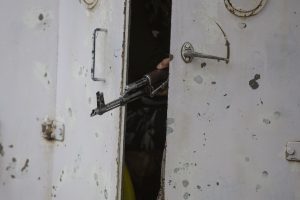Indian government forces killed a top rebel commander and his aide in disputed Kashmir on Wednesday and shut down cellphone and mobile internet services during subsequent anti-India protests, officials and residents said.
India’s security officials and some members of the ruling Bharatiya Janata Party called his death as a major victory against insurgents. The killing could spark more unrest in the region.
Naikoo, 35, was the chief of operations of the region’s largest indigenous rebel group, Hizbul Mujahideen, which has spearheaded an armed rebellion against Indian rule.
He was the group’s top commander for almost eight years and was responsible for recruiting dozens of Kashmiris to fight against India, according to officials. He shot into prominence after a 2016 public uprising following the killing of the group’s charismatic leader, Burhan Wani.
After Wani’s death, Naikoo helped give new life to the militant movement. He unified rebel ranks, which had been divided by splinter factions.
A large contingent of police and army soldiers in armored vehicles launched an operation in the Awantipora area in southern Kashmir late Tuesday based on a tip that militant commanders were sheltering there. They used earth movers to dig up several patches of land, including a school playground, looking for possible underground hideouts, residents said.
Troops blasted at least two civilian homes with explosives, a common tactic employed by Indian troops in Kashmir.
On Wednesday, as the government forces began house-to-house searches in the area, they came under gunfire from rebels, police said. In the ensuing firefight, two militants were killed, a police official said on condition of anonymity, keeping with government policy. He identified one of the slain rebels as Naikoo. The officer said Naikoo was the most wanted militant in Kashmir, and troops had conducted dozens of operations to get him.
Before joining the group, Naikoo was a popular mathematics teacher.
Some anti-India protests and clashes between protesters and government forces were also reported in the area where the gunfight occurred.
Government forces fired bullets, shotgun pellets, and teargas at a large anti-India protest that hit the streets and threw stones at the troops shortly after the news of the rebel leader’s killing spread. At least a dozen civilians were injured in the clashes, locals and medics said. One among the injured was in critical condition with a gunfire injury.
Authorities did not hand over the bodies of the two slain rebels to their families under a new government policy designed to thwart large-scale funerals that had become a norm and a rallying point for anti-India protests.
The police officer said the slain rebels were buried in a remote mountainous graveyard some 100 kilometers (62 miles) away from the gunfight site, which has also happened to be Naikoo’s native village.
Authorities first blocked mobile internet service, a common Indian tactic in the region when such fighting erupts. As the fighting continued and word spread that Naikoo was trapped, they also stopped mobile phone service.
Authorities say it is necessary to halt cellphone and internet service to prevent anti-India protesters from assembling.
In 2019, the government imposed a months-long total communication blackout during an unprecedented military crackdown in the strife-torn region.
India has stepped up its counterinsurgency operations across Kashmir in recent months during a coronavirus lockdown. Militants have also continued their attacks on government forces and alleged informants. More than two dozen militants and about a dozen Indian troops were killed in April, the most in any month since August 2019, when India revoked the region’s semi-autonomous status and statehood and imposed direct federal rule.
There also has been almost daily fighting over the last several months along the rugged and mountainous frontier that divides Kashmir between India and Pakistan, leaving soldiers and civilians dead on both sides of Kashmir.
India and Pakistan both claim the territory in its entirety. Most Kashmiris support the rebel goal of uniting the territory, either under Pakistani rule or as an independent country, while also participating in civilian street protests against Indian control.
India accuses Pakistan of arming and training the anti-India rebels. Pakistan denies this, saying it offers only moral and diplomatic support to the militants and to Kashmiris who oppose Indian rule.
Rebels have been fighting Indian rule since 1989. About 70,000 people have been killed in the uprising and the ensuing Indian military crackdown.
By Aijaz Hussain for the Associated Press.

































